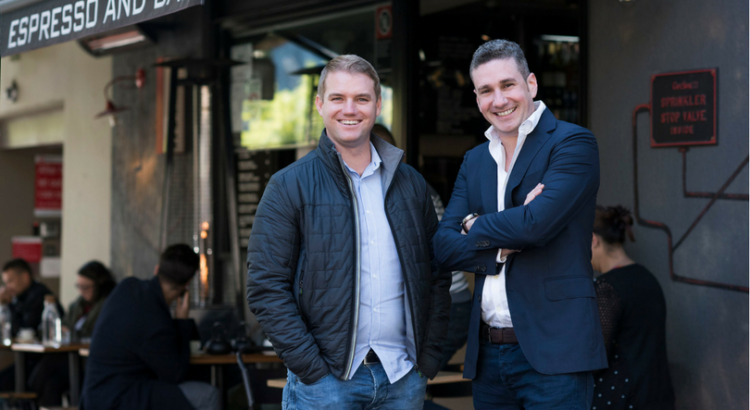Beau Bertoli and Greg Moshal, co-founders and joint-CEOs of Prospa, are changing the way small businesses find loans by taking Australian SME lending online. Prospa is using proprietary software to provide SMEs with capital at the speed with which they operate. In February, they were awarded the Lending Innovator of the Year Award in the inaugural FinTech Business Awards, and are still annually achieving triple-digit growth rates. Propsa also won the Highest Trending Company Award in the Techboard 2017 National Awards and topped the Techboard Ranking of Trending Australian Startups and Young Tech Companies twice in 2017 including in July 2017. Robin Block from MitchelLake sat down with Beau to discuss how Prospa is set to change the way Australian b2b lending operates before expanding internationally and into other financial service markets.
Beau: “All businesses, big or small, can use cash and funding to grow. Greg Moshal and I have both been small business owners for years. Having dealt with the system and options available in Australia, we thought there had to be a better way. The inspiration was very personal in that regard — we didn’t want to create a solution that only incrementally improved the system, we wanted to wholesale change it.”
Robin: What lessons have you learned building Prospa and what is the largest challenge facing the company?
Beau: The biggest lesson for me has been learning that it’s okay to let go. Moving away from the start-up phase and becoming a scale-up forces you to come to terms with the fact that the company you spent years creating has become bigger than just you. For Greg and I, Prospa is our baby. But, we now have highly capable and talented teams that we have to entrust to make decisions and empower to bring their own plans to life. There was a stage about three years ago where I was trying to be in fifty meetings a week and was simply forced to step back. Trying to retain total control puts a cap on your ability to grow.
The biggest single challenge for the business is coping with growth. It’s a good problem to have, but it’s a hard one. We could grow faster but have deliberately taken the foot off a little. Many companies outgrow their capabilities and that can lead to all kinds of issues. Meeting capital requirements makes this particularly true for us, and we always have to work to secure new sources of funding. It is essential we grow within our means and accelerate growth at the right time. For us, that is typically a 6-month cycle. Right now, we are in a stabilisation period which will last until the end of the year. We have 146 people and 26 open roles. We will need to put those people into teams to prepare for expansion.
Robin: With those growth levels, how have you sought to manage company culture?
Beau: We’ve done a number of things to try and keep our culture strong and clear. A huge part of that is just being deliberative in your hiring process all the way through. With 20 people, you are sort of like a family, everyone knows each other — their strengths and their weaknesses. At 40-50 people, things change. We looked at the first 40 people we hired as critical hires — not just the first two or three – and have continued to emphasise cultural fit moving forward. We do cultural interviews with every single person we bring on board — going as far as to create cultural ambassadors. These ambassadors have final veto power over every candidate. And we call it out when we see people not living the culture. We have that conversation in an open and real manner — either they change or Prospa is the wrong place for them to be.
Inclusiveness is another vital aspect of building a positive culture. If you bring people in on the directional and strategic planning for the business, you get more buy-in. When people contribute, even if their ideas aren’t chosen, it makes them feel like they have a voice that is valued. Our leadership team is made up of 26 people — which is quite a lot for an organisation of our size. We make sure those people speak with their teams and source ideas from throughout the entire company. We think of ourselves as a scale-up, but we have legacy start-up DNA. A lot of effort goes into retaining the awesome portions of that — a culture of innovation. It is also necessary, however, to develop a capability to say no to ideas — something that is often a struggle for start-ups.
In addition to being crystal clear on your business culture, you need to identify that your leadership culture is, in fact, a separate entity, and equally important. When looking for executives, we made sure to hire the right people for the right stage of the business. Someone who had been running a team of 500 people — who would now be running a team of 11 — wouldn’t be right. At Prospa, we want leaders who are great coaches, people who want to see those on their teams develop and move up in their careers.
Robin: How difficult has the entire talent acquisition process been?
Beau: It has been bloody hard work, and it’s vital to get right. When trying to pull people to a company they have never heard of, you have to be concise and compelling in selling the idea. At the early stages of the business, you can’t pay massive salaries — and plenty of incumbents can, particularly in the tech industry. This means getting buy-in on the business. In many cases, we have simply had to ask for their trust — back us and we will go through this journey together, either to win or fail together. In the last few months I think we have crossed something of a chasm. The value proposition of the brand has started to become an entity of its own, and we’re getting people coming to us already sold on the company. That’s an important development.
The talent gap in the tech world is in engineering and analytical functions. There are plenty of people who know how to code, but there are a lot fewer that know how to code really, really well. If you get a 9-out-of-10 engineer and a 7-out-of-10 engineer — the 9 will give you ten times the quality and output. Finding those top echelons is the challenge. Data scientists are even harder because many of the ones that are great at the maths aren’t good at putting that data in a format that is digestible to non-professionals. We capture every data point that comes in and out of our business. Analytics are going to be a major part of how to add value in this market because the insight will allow us to build products in line with customer needs. We are looking to invest in AI and other machine learning technologies. Data is a major competitive advantage.
Robin: What is your vision for the future — is there an ‘end-game’?
Beau: The long-term vision is to change the way people experience finance — but, we don’t have an ‘end game.’ We’ve been in this business for five years. We have a clear plan for the next 12 months, a vague plan for the next three years — beyond that, we will build that plan in 2020. However, we’re excited. We see ourselves being a leading b2b service business.
Right now, we are in financial services and commercial-lending/small-business lending. That’s a huge market in which we have a long way to grow, but is also a niche category. We see other product possibilities. The Australian financial system is quite dysfunctional. The large banks are very profitable, but don’t know how to really engage their customers – and when they manage to design innovative products they can take a long time to get them to market. By then, customer expectations will have changed. We have a massive opportunity to do something amazing here in Australia.
It is important to invest in your teams. We spend a lot of money each year on conferences and activities — we have learning and development programs that run on an almost permanent basis. Even Greg and I have an executive coach. Every other month, we have almost half a day with them. You’re a coach yourself, but you also need to be coached. A lot of senior people think that they have reached their pinnacle — but you never have. You have a skillset, but you can always improve those skills. The difference between business and being an athlete is that with age, you can actually get better — continue to improve. As an athlete, you have a shelf-life. With business, the shelf life is 75 — and even then, look at Warren Buffett. I think Prospa has come a hell-of-a-long-way — we have an amazing team, and awesome opportunities ahead of us. It’s really up to us to now get on with it and make it happen or not. Part of the beauty of the tech industry is the necessity of change — it’s hard to say exactly where that path will lead.
Visit Prospa’s Techboard Profile

Robin Block is Head of Engagement at the MitchelLake Group in Sydney. Robin explores the human stories behind digital transformation and how they are changing the future of business.



